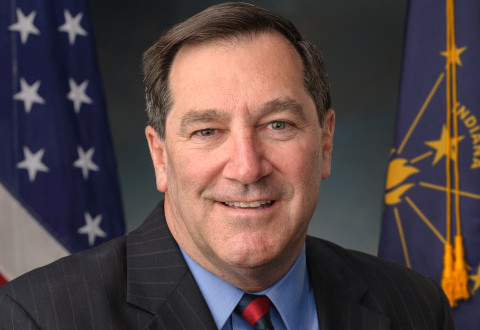Washington, D.C. – As the Senate Agriculture Committee prepares to work on the 2018 Farm Bill, U.S. Senator Joe Donnelly, who serves on the committee, outlined a number of Hoosier priorities for the bill. In a letter to Committee Chairman Pat Roberts (R-KS) and Ranking Member Debbie Stabenow (D-MI), Donnelly reiterated what he heard from Hoosier farmers during the 12 listening sessions he has held across the state. During these listening sessions, Donnelly heard from Hoosiers involved in nearly every segment of Indiana’s agriculture community about all that a farm bill should do, including: to help manage uncontrollable risks, develop new market opportunities, promote voluntary conservation, support rural communities, invest in tomorrow’s farmers and technologies, and fight hunger.
Donnelly said about his letter and Hoosier priorities for the Farm Bill, “I know there is more wisdom in Indiana than in Washington, which is why I continuously travel across the state to hear directly from Hoosiers on the issues most important to them, including their priorities for the upcoming Senate farm bill. I’m the hired help, and I am committed to being an advocate for Indiana agriculture and bringing Hoosier ideas to writing a farm bill that works well for farmers and rural communities and addresses food insecurity.”
Through his work on the Senate Agriculture Committee, Donnelly has worked tirelessly to advocate for Hoosier farmers and rural communities. As part of the previous Farm Bill, Donnelly successfully pushed several measures that were signed into law in 2014. The Farm Bill is typically reauthorized every five years, and the current bill expires in September 2018.
A copy of the text of Donnelly’s letter is below and here.
June 4, 2018
Charmain Senator Pat Roberts
Ranking Member Senator Debbie Stabenow
Committee on Agriculture, Nutrition, and Forestry
Dear Chairman Roberts and Ranking Member Stabenow,
As the Senate Committee on Agriculture, Nutrition, and Forestry finalizes provisions in the draft 2018 Farm Bill, I want to reiterate a number of important priorities for Hoosiers. I collected these priorities from Indiana farmers, agriculture students and researchers, and anti-hunger advocates over the course of twelve listening sessions, and I believe their input is critical as the committee develops a farm bill that works well for both agriculture and rural communities and addresses food insecurity.
Managing Risk
As I travel around the state, farmers have expressed the need for a farm bill that manages and helps mitigate the uncontrollable risks of farming. Crop insurance is the cornerstone of risk mitigation, and the committee should work together to protect and improve access to crop insurance. Farmers, whether they run large or small operations, or are growing conventional, organic, or specialty crops, should have equal access to the peace of mind crop insurance provides.
Hoosier farmers have also suggested a few changes to commodity support programs in order to improve their effectiveness, including the use of Risk Management Agency data to calculate yields and the use of farm location rather than administrative county for support determinations. It is essential that the commodity programs reflect market conditions, instead of essentially ensuring annual payments to farmers of certain crops with guaranteed prices that are significantly higher than historical average market prices. Any updates to the commodity programs, however, should maintain full planting flexibility, allowing farmers to grow non-commodity crops by voluntarily taking a one year reduction in payment acres without permanently losing access to commodity programs. For our livestock farmers, we should invest in an animal disease and disaster prevention program, including a vaccine bank for quick responses to potential risks to animal health.
Developing New Markets
I have heard routinely from farmers about the importance of expanding market opportunities in order to address low commodity prices and increase farm incomes. As such, the 2018 Farm Bill should significantly increase investment in export promotion programs like the Market Access Program and the Foreign Market Development program. The committee should support programs that boost progress in bioenergy and bio-based products and facilitate the growth of local and regional food systems. The committee should also ensure a level playing field for those who have made investments in organic production by better detecting fraudulent imports.
Promoting Voluntary Conservation
Soil health and clean water are strong passions of many Hoosiers, and the committee’s bill should provide farmers with the tools and resources they need to be good stewards of the environment. We must ensure that voluntary conservation activities like planting cover crops receive the same protections in the crop insurance programs as other good farming practices. Conservation activities that are approved by the Natural Resources Conservation Service or other local agricultural experts should not put a farmer’s full eligibility for crop insurance at risk. In addition, the bill should maximize the conservation technical assistance available for farmers, target program investments to the most effective practices, and close loopholes that allow some producers to avoid compliance with conservation requirements.
Supporting Rural Communities
We know that farmers care deeply about their local communities, and the farm bill is an excellent opportunity to provide the tools that rural communities need to continue to thrive. USDA’s Rural Development programs should focus on providing true high-speed internet access as well as financing and providing technical assistance for drinking- and waste-water infrastructure, all of which are essential for communities to attract investment and growth. Further, the committee should pursue every opportunity to provide the resources required to fight the devastation brought by opioid addiction and substance abuse. As you both know, I have introduced a bipartisan package of legislation to promote investments in local treatment facilities, telemedicine, prevention, and education efforts. I thank you for your past support of those provisions, particularly Chairman Roberts, and I am hopeful that the committee’s bill will include them. Similarly, I was alarmed at the recent reports regarding the prevalence of suicide among farmers, and I ask that the committee provide farmers with the mental health resources they need.
Investing in Tomorrow’s Farmers and Technologies
The farm bill is also a chance to provide for the future of agriculture by making the investments in vital research and extension activities and supporting a new generation of farmers and researchers. Indiana’s universities and Purdue Cooperative Extension System use the National Institute of Food and Agriculture’s Agriculture and Food Research Initiative, Hatch Act, and Smith-Lever programs to support the research, workforce development, and dissemination of practical applications of new technologies that drive the innovation that increases the productivity of farms throughout Indiana. Similarly, the committee should recognize the difficulties that face beginning farmers and ensure that USDA programs sufficiently accommodate the needs of new farmers. Further, expanding support for veterans interested in agriculture is a worthwhile investment, and I thank you both for your leadership on that issue.
Fighting Hunger
Finally, the importance of fighting hunger in our communities should not be forgotten. Nearly one in seven Hoosiers are food insecure and at times do not have access to enough food for a healthy and active lifestyle. The committee should pursue bipartisan opportunities that fight food insecurity and maintain program integrity like extending the certification window for food insecure seniors enrolled in the Commodity Supplemental Food Program and the Supplemental Nutrition Assistance Program.
The committee has an excellent opportunity to develop a 2018 Farm Bill that will work well for all stakeholders. Given the rich agricultural tradition and diverse agricultural production in Indiana, I have always thought that a good farm bill is one that supports the hard work of the Hoosier agriculture community. I recognize that a successful farm bill will require us all to work together as advocates for agriculture, and I am hopeful the committee will give Indiana’s priorities significant consideration. I thank you both for your commitment to developing a bipartisan 2018 Farm Bill and I look forward to working with you to that end.
Sincerely,
U.S. Senator Joe Donnelly






